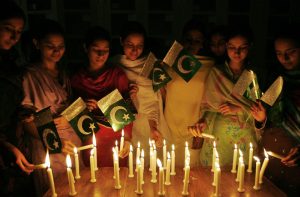Pakistan is all set to commemorate its 75th independence day on 14th August with traditional fervor and zeal. Celebrations will include grand displays and reiteration of promises to transform Pakistan into a diverse, multicultural, and tolerant society as per the vision of its founder, Muhammad Ali Jinnah.
Since Jinnah’s death in 1948, Pakistan’s leaders have marked Independence Day with fanfare, making sure that the founding father’s vision remains at the center of all celebrations. However, with every passing year, the country has only moved further away from Jinnah’s vision.
After more than seven decades, the country has not been able to escape the “India syndrome,” meaning some vested interests in Pakistan have made unambiguous efforts to find a permanent enemy in India. As has been the tradition since the country’s inception in 1947, anti-India oratory will mark Pakistan day.
For many in Pakistan, independence is more about showing the world that India remains an exclusive threat to Pakistan’s existence and that the partition of the Indian subcontinent has not been accepted by New Delhi yet.
In the words of French Orientalist Ernest Renan, “Getting its history wrong is part of being a nation.” This accurately describes Pakistan’s case. For more than seven decades, the history taught at Pakistan’s schools tried to make a case for a country that was part of some sort of prophecy. For instance, school children are taught that Pakistan has its origins in Muhammad bin Qasim’s eighth-century invasion and takeover of Sindh, one of Pakistan’s current provinces, and that Islam was the sole uniting force behind the Pakistan movement.
To this day, debate remains open on whether Jinnah wanted a state whose laws were to come into conformity with Islam. On the other hand, many historians have argued that the creation of Pakistan was perhaps the unintended result of Jinnah’s strategy to force the Indian National Congress to accept a federated arrangement in which Muslim majority provinces would have considerable autonomy.
If anything, Pakistan’s Islamic identity has not been able to keep the country united. As Pakistan celebrates its 75th independence day, the country is internally divided along religious lines. Islamic parties and right-wing conservative groups openly and regularly dispute the state’s writ.
Pakistan’s 1973 constitution lays out the rules of governance. However, political parties and state institutions have done everything to trample the laws of the land. For instance, the real power in Pakistan does not rest with the Prime Minister’s Office and Parliament – the two institutions that are supposed to make key policy decisions under the constitution.
There are other institutions that have become so powerful that they have literally become a parallel state with little accountability.
The irony is that opportunistic politicians and religious fundamentalists look toward these state institutions for support to sustain their own grip over power, and in the process strengthen their hold over the state’s affairs further.
Pakistan is currently in the midst of one of its worst political, constitutional, and economic crises in its history. Parliament has become practically irrelevant as the political elite is at loggerheads. The country’s judicial system faces a collapse, as thousands of cases remain pending in courts. The bureaucracy is deeply politicized and resists reforms that could see the administrative system becoming more effective.
The country’s security institutions are more involved in managing politics than doing their mandated work under the constitution. Moreover, militant groups and their ideologies have taken deep root in Pakistani society. As I write this, there is a mounting power struggle among political groups and institutions which could see Pakistan getting destabilized substantially.
The country is far more intolerant, regressive, and radical than ever before. Indeed, the biggest security crisis confronting Pakistan today emanates from within rather than from outside.
In this setting, Independence Day should be a day to reflect and ponder on the mistakes of the past rather than celebrating fiction as history. It is about time that Pakistan’s leadership do some course correction and think about making Pakistan a country that is respected, valued, and sought after by the world.
More than ever, Pakistan needs a clear direction, otherwise, the gradual decay of the state’s institutions and ethos would eventually lead to the implosion of the state.

































